#Python online course
Explore tagged Tumblr posts
Text
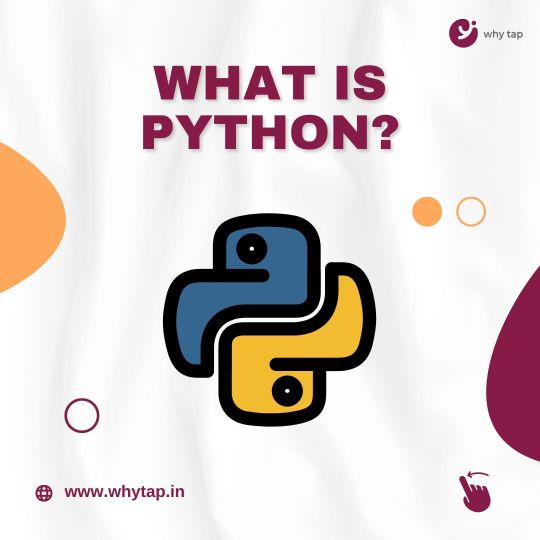
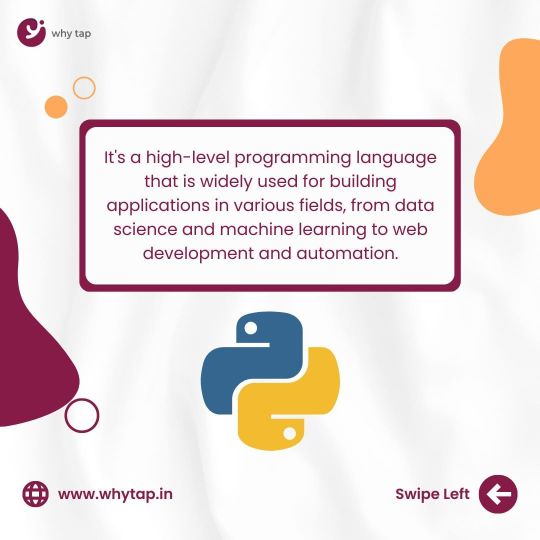
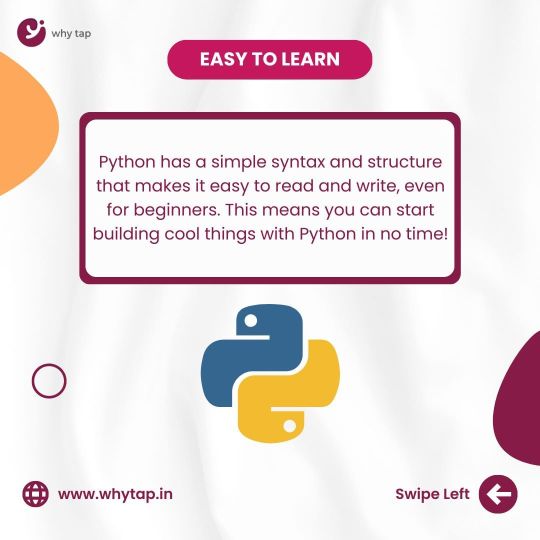
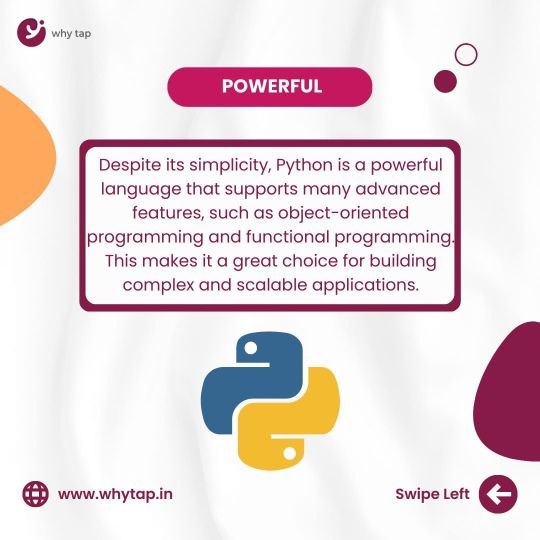
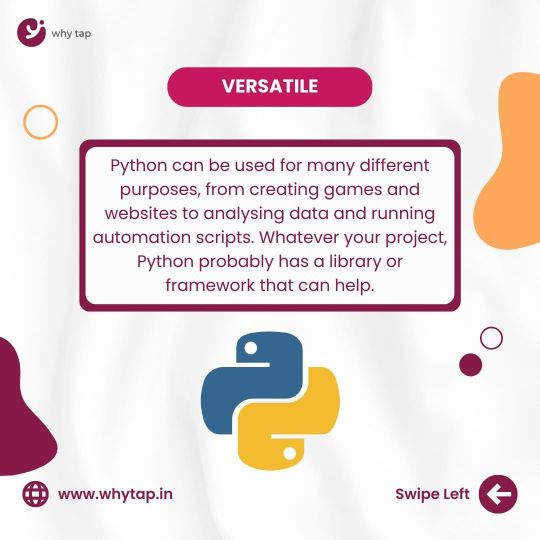
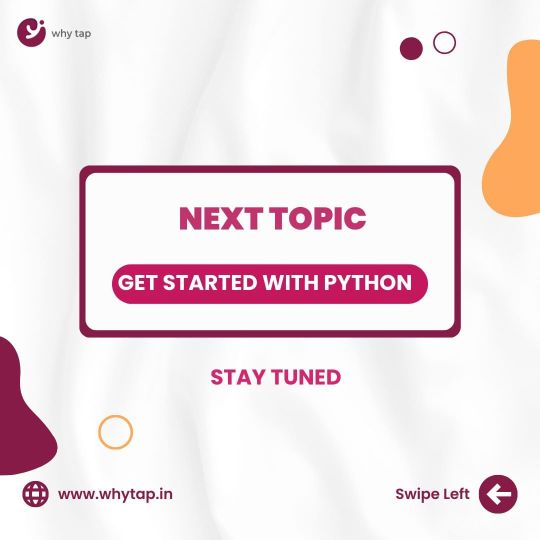
WHY tap
#python#versatile#python certification#python online course#python programming#programming#python developers#python tutorial#placement#training
15 notes
·
View notes
Text
PYTHON - Code With Josh ...
youtube
Post #163: YouTube, Free Python course for beginner, Code with Josh, 2025.
#programming#education#coding#i love coding#coding is fun#learning#i love programming#i love python#programming language#teaching#learn python#educacion#python online course#python coding#python tutorial#Youtube
2 notes
·
View notes
Text
The Benefits of Learning Python: A Comprehensive Guide
Python is more than just a programming language—it’s a gateway to an array of opportunities in the tech world and beyond. Considering the kind support of Learn Python Course in Hyderabad Whatever your level of experience or reason for switching from another programming language, learning Python gets much more fun.
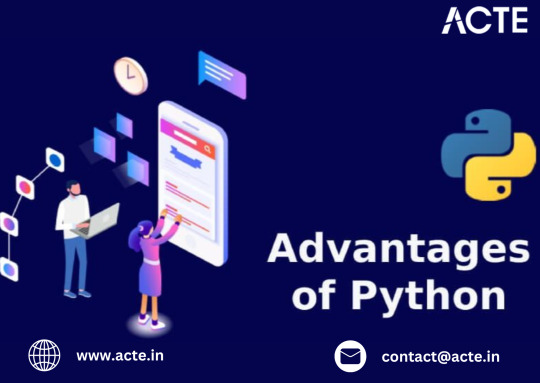
Known for its simplicity, versatility, and extensive ecosystem, Python has become the language of choice for developers, data scientists, and even beginners exploring programming. In this guide, we’ll delve into the numerous benefits of learning Python and why it’s worth your time and effort.
Why Python?
Python’s growing popularity is driven by its adaptability and ease of use. Let’s explore the key benefits that make Python stand out:
1. User-Friendly Syntax
Python’s syntax is simple and intuitive, resembling natural language. This makes it easier for beginners to grasp programming concepts and for experienced developers to write cleaner, more efficient code.
2. Versatility Across Industries
Python’s applications span diverse domains, including:
Web Development: Frameworks like Django and Flask simplify the creation of dynamic websites and web applications.
Data Science and Analytics: Libraries like Pandas and NumPy empower analysts to handle, manipulate, and visualize data effectively.
Artificial Intelligence and Machine Learning: TensorFlow, PyTorch, and Scikit-learn make Python the backbone of AI and ML projects.
Automation and Scripting: Automate repetitive tasks and streamline workflows with Python’s scripting capabilities.
Game Development: Create interactive games using libraries like Pygame.
3. Extensive Library Support
Python boasts a rich collection of libraries and frameworks that save time and effort. Whether you’re processing data, building websites, or working on AI models, there’s likely a library to help. Enrolling in the Best Python Certification Online can help people realise Python’s full potential and gain a deeper understanding of its complexities.

4. Community and Resources
Python has one of the most active and supportive developer communities. Beginners can easily find tutorials, forums, and answers to questions on platforms like Stack Overflow, Reddit, and Python’s official documentation.
5. Cross-Platform Compatibility
Python code runs seamlessly across multiple operating systems, including Windows, macOS, and Linux. This flexibility ensures that developers can write code once and deploy it anywhere with minimal adjustments.
6. Career Opportunities
Proficiency in Python opens doors to lucrative career paths in software development, data science, AI, machine learning, web development, and more. The demand for Python developers continues to grow, making it a highly valuable skill in the job market.
7. High Productivity
Python’s simplicity allows developers to focus on solving problems rather than worrying about complex syntax or debugging errors. This boosts productivity, making Python a favorite among startups and enterprises alike.
8. Future-Proof Skill
As technology evolves, Python’s adaptability ensures its relevance across emerging fields like quantum computing, Internet of Things (IoT), and blockchain. Learning Python today means investing in a skill that will remain valuable for years to come.
How to Start Learning Python
Install Python: Download it from the official Python website.
Learn the Basics: Focus on fundamental concepts like variables, loops, and functions.
Use Online Resources: Explore platforms like Codecademy, freeCodeCamp, or Coursera for structured tutorials.
Practice Projects: Build simple projects like calculators or to-do lists to reinforce your skills.
Join Communities: Engage with fellow learners and professionals to exchange ideas and gain insights.
Conclusion
Learning Python is a smart investment in your personal and professional growth. Its simplicity, wide-ranging applications, and strong community support make it an excellent choice for anyone looking to enter the tech world or enhance their skill set. Start your Python journey today and unlock endless possibilities in programming, data science, AI, and beyond!
#python course#python training#python#technology#tech#python online training#python programming#python online course#python certification#python online classes
0 notes
Text
https://www.trangran.com/features-of-python-career-in-it/
Python is a versatile, easy-to-learn programming language known for its simplicity and readability. It supports multiple programming paradigms, including object-oriented, functional, and procedural styles. Python has a rich ecosystem with libraries like NumPy, Pandas, and TensorFlow, making it ideal for data science, machine learning, web development, automation, and more.
0 notes
Text
Why Python is the Most Used Language for Machine Learning
Python is a high-level, general-purpose programming language widely recognised for its readability and simplicity. Guido van Rossum developed it in the late 1980s, and it supports multiple programming paradigms, including procedural, object-oriented, and functional programming. Python has become the most popular programming language for machine learning (ML), particularly resonating with students and aspiring developers in India, especially in a tech-forward city like Delhi. Here's an in-depth look at why python institute in Delhi is the preferred choice for ML.

5 Reasons Why Python is the Most Used Language
Python has quickly become the most popular language for a wide range of applications, especially in machine learning and data science. Here are five key reasons why Python dominates the programming landscape.
Extensive Libraries and Frameworks
Python offers a vast ecosystem of libraries and frameworks that streamline various machine learning tasks. Some of the most notable ones include:
NumPy: Essential for numerical computations and handling arrays.
Pandas: Excellent for data manipulation and analysis.
Scikit-learn: Provides tools for data mining and machine learning algorithms.
TensorFlow and PyTorch: Popular frameworks for deep learning applications.
These libraries dramatically reduce the amount of code required to implement complex algorithms, allowing developers to build models more efficiently.
Strong Community Support
Python, being open-source, has built a large community of developers who continually contribute to its libraries and frameworks. This community ensures that learners can easily find resources, tutorials, and forums to resolve issues and improve their skills. The collaborative environment promotes knowledge sharing, making it easier for students to learn from one another.
Cross-Platform Compatibility
Python’s platform independence allows developers to write code on one operating system and run it on another without modification. This feature benefits students who may not have access to high-end machines or specific operating systems. They can develop their projects on any platform—whether Windows, macOS, or Linux—making Python more accessible to a wider audience.
Flexibility and Scalability
Python’s versatility allows it to be used in a range of applications beyond machine learning, such as web development, data analysis, and automation. This flexibility means students can apply their Python skills across different domains. As projects grow in complexity, Python’s scalability helps developers manage large codebases without sacrificing performance or readability.
Reduced Development Time
Compared to languages like Java or C++, Python allows for faster development cycles. Python code typically requires fewer lines than other languages, enabling developers to implement features more quickly. This efficiency is especially valuable in the fast-paced world of machine learning, where prototyping and iteration are crucial.
Why is Python More Readable than Other Languages?
Python is often regarded as more readable than other programming languages due to several characteristics that enhance its clarity and ease of understanding. Here are the key reasons why Python stands out in terms of readability:
Simple and Clear Syntax
Python’s syntax is straightforward and intuitive, making it resemble natural language. This simplicity allows developers to express concepts in fewer lines of code than languages like C++ or Java, where verbosity often hides the logic. For example, Python uses indentation to define code blocks, eliminating the need for braces or keywords that can clutter the code.
Minimal Boilerplate Code
In Python, developers can accomplish tasks with minimal boilerplate code. This allows them to focus more on the core logic of the programme, with fewer distractions. Python’s high-level nature encourages abstract thinking, translating into cleaner, more maintainable code.
Use of Whitespace
Python enforces a disciplined coding style through its requirement for indentation, promoting a clean visual structure. This use of whitespace makes it easier to follow the programme's flow, which is particularly beneficial for beginners still learning programming concepts.
Should You Study Python?
Python training in Delhi is highly beneficial for students and professionals. Its simplicity makes it an excellent choice for beginners. Its applications span web development, data science, artificial intelligence, and machine learning, all of which are increasingly relevant in today’s job market.
In India, the demand for Python developers continues to soar. Companies are actively seeking skilled professionals who can leverage Python’s capabilities to drive innovation and efficiency. On average, a Python developer in India earns around ₹5,28,500 per annum, with potential earnings reaching up to ₹15 lakhs, depending on experience and expertise.
Conclusion
Python’s syntax prioritises clarity, using indentation to define code blocks, which makes it easy to read and maintain. Its extensive standard library equips developers to handle a wide range of tasks, from web development to data science and automation. Additionally, Python’s robust community provides extensive support, ensuring ample resources for learners at all levels. With its wide range of applications and growing demand in the Indian job market, python courses from ESS Institute offer immense opportunities for career growth.
0 notes
Text
https://followingbook.com/post/193813_python-online-classes-master-coding-with-kodyfier-in-india-if-you-039-re-eager-t.html

#python online classes#python online class#python online classes in india#python online course#python online training#kodyfier
0 notes
Text
Linked Lists in Python | Python Institute in Delhi
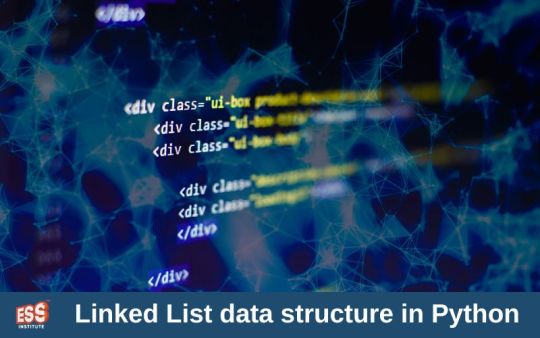
Linkedlist is one of the most complex data structure which is difficult to understand for new programmers as well as professionals. So, In this article by a trainer from python institute in Delhi, you will learn about linkedlist in detail
We’ve all heard of data structures in python, and linked lists are among the most important data structures for both interviews and your coding journey. We will go through various operations on the linked list and the Big O complexities as well. Before we get into the liked list, we need to look into array because there are some issues with arrays that linked list try to solve.
Let us say, we have an array of stock prices and have a memory layout of these stock prices as shown.
Array in Python and its disadvantages
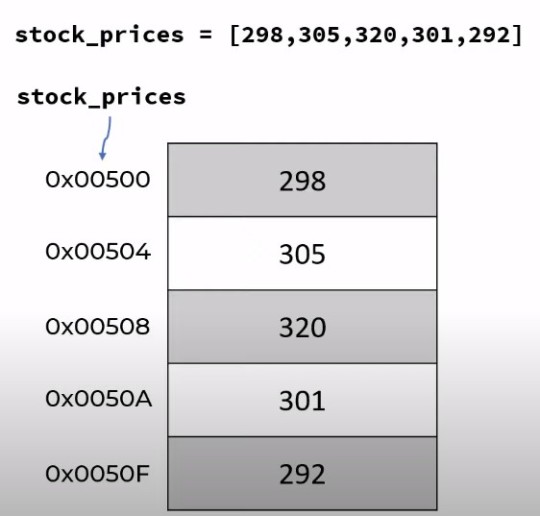
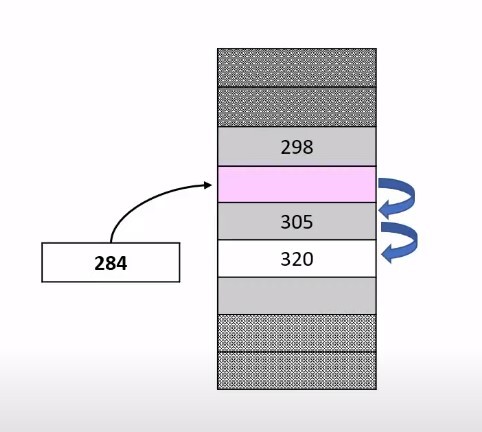
When you create an empty list in Python, Internally in the memory it will allocate some capacity for that list.
It is allocating a capacity of five elements and when you start inserting elements one by one, it will put those values in. Now at this stage when you have three elements and you want to insert 284 at location number 1, what really happens is, firstly it will swap the value at that place to make a space for 284. Here, you can see that there are 2 copy operations while doing this. Read more
#digital marketig course#python course online#python institute in Delhi#online seo course in hindi#Python online course#Python institute in Delhi
0 notes
Text

Unlock the power of Python with eMexo Technologies in Electronic City, Bangalore! 🚀🐍 Explore hands-on coding, learn from industry experts, and join a community of success stories. Ready to take the next step? Enroll now for the Best Python Training Institute In Electronic City Bangalore.🎓💻
More details: https://www.emexotechnologies.com/courses/python-certification-training-course/
Reach us 👇
📞 +91 9513216462
🌐http://www.emexotechnologies.com
🌟 Why Choose eMexo Technologies?
Expert Trainers
Hands-on Learning
Industry-Relevant Curriculum
State-of-the-Art Infrastructure
https://youtu.be/Rt9pTK8MMUw?si=-MNzSFgLp-Qj98Pz You can see this video you get clear clarification about the course.
🔥 Python Course Highlights:
Comprehensive Syllabus
Real-world Projects
Interactive Sessions
Placement Assistance
🏆 Best Python Training Institute in Electronic City, Bangalore!
Our commitment to excellence makes us the preferred choice for Python enthusiasts. Get ready to embrace a learning experience like never before.
📆 Enroll Now! Classes are filling up fast!
📌 Location: #219, First Floor, Nagalaya, 3rd Cross Road, Neeladri Nagar, Electronics City Phase 1, Electronic City, Bengaluru, Karnataka 560100
#pythontraininginbangalore#python course#python training#python developers#python#pythontraininginstituteinelectroniccity#pythoncourseinelectroniccity#besttraininginstituteinelectroniccitybangalore#python online course#python online training#python certification#emexotechnologies#electroniccity#bangalore#course#traininginstitute#education#learning#training#careers#jobs#studyblr#programming
0 notes
Text
Master Python with the Best Online Course
Elevate your programming prowess with our top-rated Python course. From basic syntax to advanced algorithms, sharpen your skills and become a proficient Python programmer ready to tackle any challenge.
#python classes#python course#python online training#python online course#python training#neuailabs#futureofai
0 notes
Text
Mastering UI Development and Python: Unlocking Your Coding Potential
In the fast-paced digital landscape, UI developers play a pivotal role in creating seamless and visually stunning user experiences. Our UI developer online course is crafted to empower you with the skills needed to thrive in this dynamic field.
The Basics: Navigating the UI Developer Course
Embark on your coding journey by mastering the fundamentals. From HTML and CSS essentials to responsive design principles, this course lays the groundwork for your success. Unlock the secrets behind creating intuitive interfaces that captivate users.
Advanced Techniques: Elevate Your UI Development Game
Take your skills to the next level with advanced UI development techniques. Delve into JavaScript frameworks like React and Vue.js, gaining the expertise to build interactive and dynamic user interfaces. Our hands-on approach ensures you apply your knowledge in real-world scenarios.

UI/UX Harmony: Creating User-Centric Designs
A great UI developer understands the symbiotic relationship between user interface (UI) and user experience (UX). Learn how to design interfaces that not only look impressive but also enhance the overall user journey. Elevate your projects with user-centric design principles.
Python Mastery: A Language for Innovators
Welcome to the Python Online Course
Python, a language renowned for its simplicity and versatility, opens doors to endless possibilities. Join our python online course to unleash the true potential of this programming language.
Python Fundamentals: Building a Strong Foundation
Begin your Python journey by grasping the fundamentals. From variables and data types to control flow structures, this course ensures you have a solid foundation. Navigate the Python landscape with confidence.
Beyond Basics: Advanced Python Programming
Take a deep dive into advanced Python concepts. Explore object-oriented programming, data manipulation with NumPy and Pandas, and the power of Python libraries. Acquire the skills needed to tackle complex coding challenges.
Supporting the Coding Community
Conclusion: Your Coding Odyssey Begins
Embark on a transformative journey with our UI developer and Python online courses. Whether you're a novice or a seasoned coder, our courses cater to all skill levels. Uncover the secrets of UI development and harness the power of Python, propelling yourself into the realm of coding excellence. Enroll now and let your coding odyssey begin!
0 notes
Text
Get Started With Python – PART 2
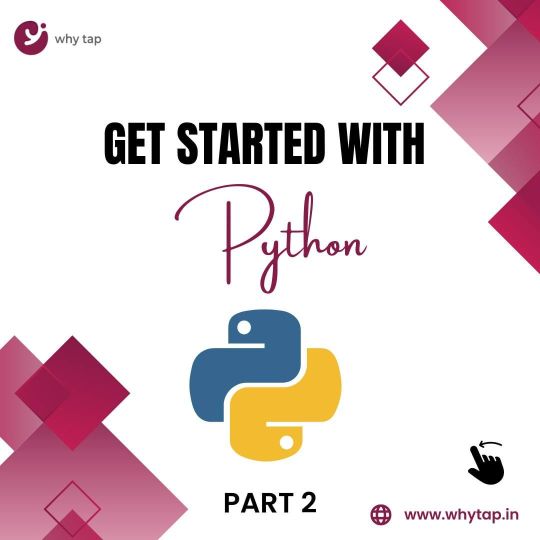
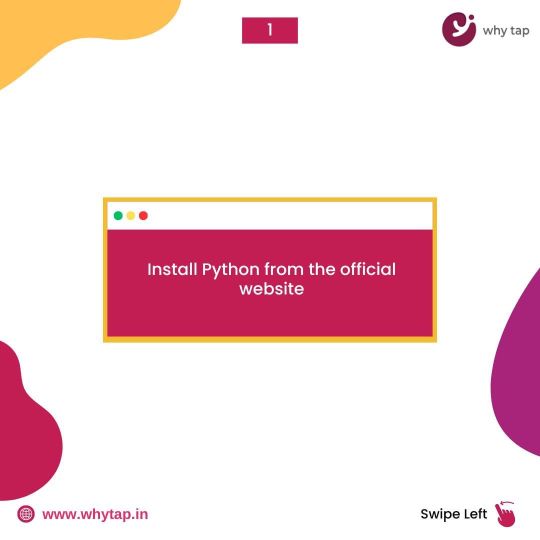

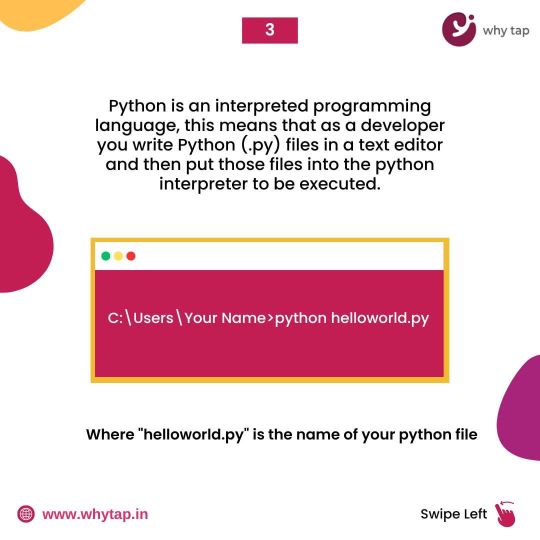
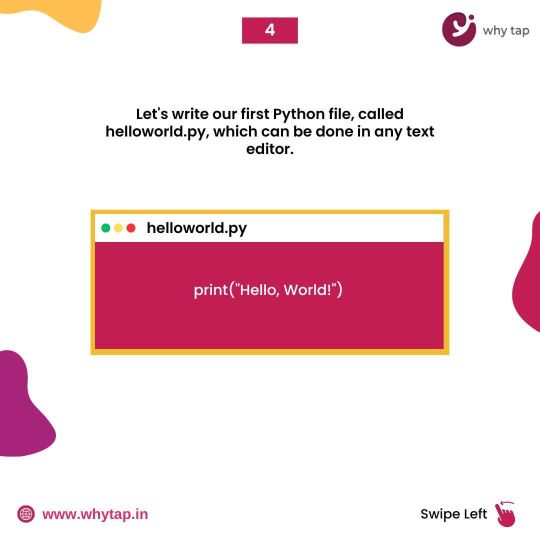
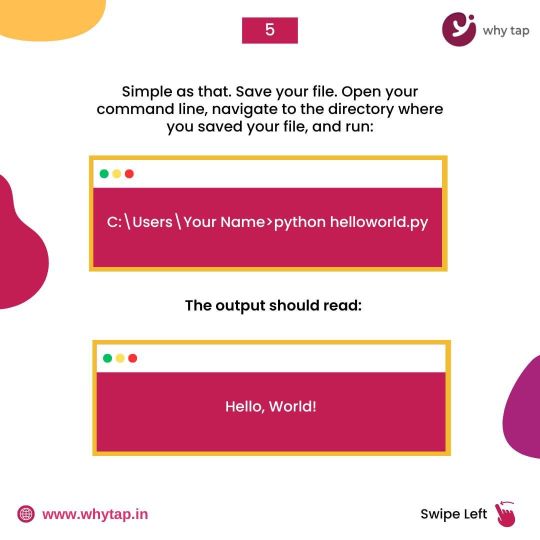
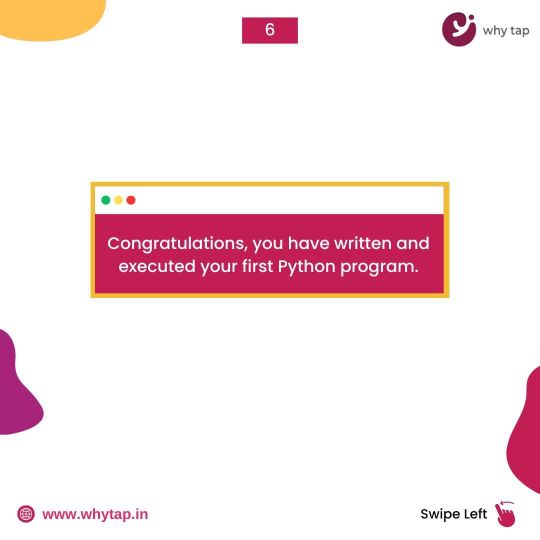

WHY tap Provides advance python certification course in Chennai
#python#python developers#pythonprogramming#python online course#placement#training#webdevelopment#programming#coding#javascript
13 notes
·
View notes
Text
The Power of Python: A Comprehensive Guide
Python has become one of the most popular programming languages in the world, renowned for its simplicity, versatility, and robust community support. Considering the kind support of Learn Python Course in Hyderabad Whatever your level of experience or reason for switching from another programming language, learning Python gets much more fun.
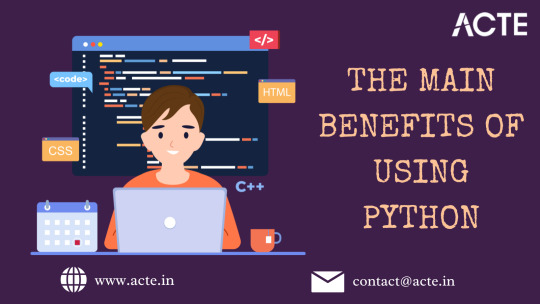
As technology evolves, so does Python, proving to be an invaluable tool across various domains. This comprehensive guide explores the power of Python, its key features, and its applications, providing insights into why it’s a language worth mastering.
1. Introduction to Python
Python was created in the late 1980s by Guido van Rossum and was officially released in 1991. It was designed with a focus on code readability, allowing programmers to express their ideas clearly and concisely. Python's clean syntax and structure make it an excellent choice for both beginners and experienced developers.
2. Key Features of Python
a. Simplicity and Readability
One of Python's most significant advantages is its simple and readable syntax. Unlike many other programming languages that can appear complex and cluttered, Python's design allows developers to write clear, understandable code. This feature lowers the barrier to entry for new programmers and makes it easier for teams to collaborate.
b. Versatile Libraries and Frameworks
Python boasts an extensive collection of libraries and frameworks that facilitate various tasks. For web development, frameworks like Django and Flask streamline the process. In data science, libraries such as Pandas, NumPy, and Matplotlib enable efficient data manipulation and visualization. Additionally, TensorFlow and Keras are powerful tools for machine learning and artificial intelligence.
c. Cross-Platform Compatibility
Python is a cross-platform language, meaning code written on one operating system can run on others without modification. This feature makes it an attractive option for developers working in diverse environments, allowing for greater flexibility and efficiency in project development. Enrolling in the Best Python Certification Online can help people realise Python’s full potential and gain a deeper understanding of its complexities.
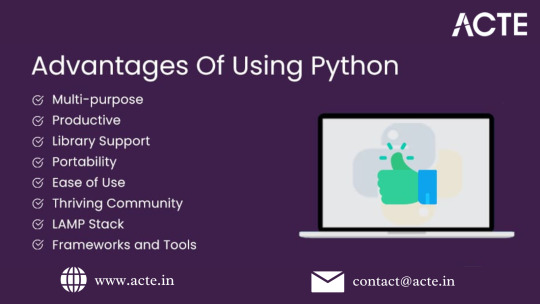
d. Dynamic Typing
Python uses dynamic typing, meaning variables do not need an explicit declaration to reserve memory space. This flexibility allows developers to write code more quickly and intuitively, but it also requires careful handling to avoid runtime errors.
3. Applications of Python
a. Web Development
Python is widely used in web development due to its frameworks that simplify backend processes. Django, for example, encourages rapid development and clean, pragmatic design, making it a favorite among developers. Flask, on the other hand, is a micro-framework ideal for building smaller applications quickly.
b. Data Science and Analytics
With the explosion of data in recent years, Python has become the go-to language for data science. Its libraries provide powerful tools for data manipulation, analysis, and visualization. Data scientists leverage Python for tasks ranging from simple data processing to complex machine learning models.
c. Machine Learning and Artificial Intelligence
Python's simplicity and rich ecosystem have made it a leading language for machine learning and AI. Libraries such as Scikit-learn, TensorFlow, and PyTorch provide developers with the tools needed to create intelligent systems that can learn from data and make predictions.
d. Automation and Scripting
Python is an excellent choice for automation tasks. Its straightforward syntax allows developers to write scripts that can automate mundane tasks, saving time and reducing human error. From web scraping to file manipulation, Python streamlines workflows across industries.
e. Game Development
Though not as common as other languages in the gaming industry, Python is still used in game development. Libraries like Pygame provide functionalities to create games quickly and easily, making Python a great option for prototyping or developing simpler games.
4. The Python Community
One of Python's greatest strengths lies in its vibrant community. Developers around the world contribute to Python’s growth by creating libraries, frameworks, and tools that expand its capabilities. The community also provides extensive resources, including documentation, tutorials, and forums where beginners can seek help and advice.
5. Getting Started with Python
If you’re interested in learning Python, here are a few steps to get you started:
Choose an IDE: Integrated Development Environments (IDEs) like PyCharm, VSCode, and Jupyter Notebook are great for writing and testing Python code.
Start with the Basics: Familiarize yourself with Python’s syntax, data types, and control structures. Online platforms like Codecademy, Coursera, and edX offer introductory courses.
Practice Regularly: Building projects, even simple ones, will enhance your understanding and keep your skills sharp.
Join the Community: Participate in online forums, attend local meetups, or contribute to open-source projects to connect with other Python enthusiasts.
6. Conclusion
Python's power lies in its simplicity, versatility, and strong community support. As technology continues to evolve, Python remains at the forefront, offering developers the tools they need to create innovative solutions across various domains. Whether you are a beginner or an experienced programmer, mastering Python can open doors to a wealth of opportunities in the tech industry. Embrace the power of Python and embark on your journey toward becoming a proficient programmer.
#python course#python training#python#technology#tech#python online training#python programming#python online course#python online classes#python certification
0 notes
Text
Python certification offers numerous advantages, especially in today’s tech-driven world. It validates your proficiency in Python, a versatile and in-demand programming language widely used in fields like Data Science, Web Development, and Automation. Earning certification boosts your resume, enhancing job prospects by demonstrating your practical coding skills to employers.
0 notes
Text

Professional online web design course for beginners covering every aspect of website desiginig using HTML, CSS and javascript with live examples.
#Best Computer Institute in Delhi#Web development institute in delhi#learn website design#basic computer course#Python programing institute#Python institute in Delhi#Python online course
0 notes
Text
https://twikkers.nl/blogs/228499/Python-Online-Course-with-Kodyfier-The-Premier-Training-Experience-in
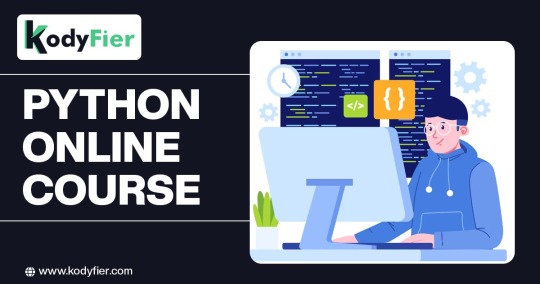
#Python Online Course#Python Online Courses#Python Online Course in India#Python Online Classes#Python Online Training#Kodyfier
0 notes
Text
What steps can I take to get ready for a data science course prior to enrolling?
The promising discipline of data science combines statistics, machine learning, and data analysis to analyze large databases for insightful information. It's crucial to get ready for the future journey if you're preparing to start a data science degree. You may use this article as a guide to prepare for a data science course before enrolling.
1. Strengthen Your Math and Statistics Fundamentals
Statistical analysis and mathematical ideas are fundamental to data science. Be sure you understand the fundamentals of algebra, calculus, and probability before enrolling in a data science course. Learn about statistical concepts such as standard deviation, mean, median, and hypothesis testing. You may improve your math's and statistics abilities for free by using resources like Coursera and Khan Academy.
2. Learn Programming Languages
Programming is at the heart of data science. Python and R are the most commonly used languages in the field. Familiarize yourself with the basics of at least one of these languages. Online tutorials and coding platforms like Nearlearn, Codecademy or DataCamp provide interactive courses to get you started. Learning the basics of data manipulation, visualization, and statistical analysis in your chosen language is a great start.
3. Get Comfortable with Data Tools
Data science often involves working with large datasets. Tools like Jupyter Notebook, pandas, and NumPy in Python, or libraries like dplyr and ggplot2 in R, are essential for data manipulation and visualization. Explore these tools and practise with sample datasets to become proficient in data handling and analysis.
4. Understand Data Cleaning
Data is rarely perfect; it often requires cleaning and preprocessing. Familiarize yourself with techniques for data cleaning, such as handling missing values, outliers, and data imputation. Learning how to prepare data for analysis is a crucial skill in data science.
5. Explore Online Courses and Resources
Before enrolling in a formal course, take advantage of free online courses and resources. Platforms like Coursera, edX, and Udacity offer introductory data science courses. These courses will give you a taste of what to expect and help you determine if data science is the right path for you.
6. Practice Problem Solving
Data science is about solving complex problems. Engage in problem-solving challenges on platforms like Kaggle and LeetCode. These platforms offer real-world data science problems and coding challenges. They're a great way to apply your knowledge, learn from others, and build your problem-solving skills.
7. Read Relevant Books and Blogs
Explore books like "Python for Data Analysis" by Wes McKinney and "Introduction to Statistical Learning" by Gareth James. Blogs like Towards Data Science, Data Science Central, and FlowingData provide valuable insights and the latest trends in data science.
8. Build a Portfolio
Create a portfolio of data science projects. Even if they're small, hands-on projects, they demonstrate your practical skills to potential employers. Share your portfolio on platforms like GitHub to showcase your work.
9. Connect with the Data Science Community
Join data science forums, attend meetups, and follow data scientists on social media. Networking with others in the field can provide valuable insights and connections that can benefit your journey in data science.
10. Set Clear Goals
Before enrolling in a data science course, define your goals. Understand why you want to pursue data science and what specific areas or industries interest you. Setting clear objectives will help you choose the right course and focus your efforts on what matters most to you.
By following these steps and dedicating time to prepare for your data science course, you'll be better equipped to grasp the concepts and excel in your studies. Remember that the world of data science is vast and ever-evolving, so stay curious, persistent, and eager to learn. Your journey in data science awaits!
#data science training#data science classroom training#data visualization#data analytics#python training#python online course
1 note
·
View note